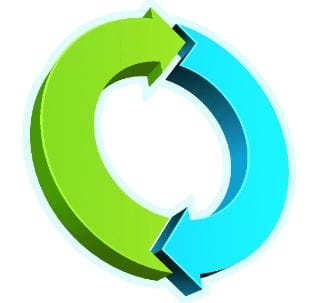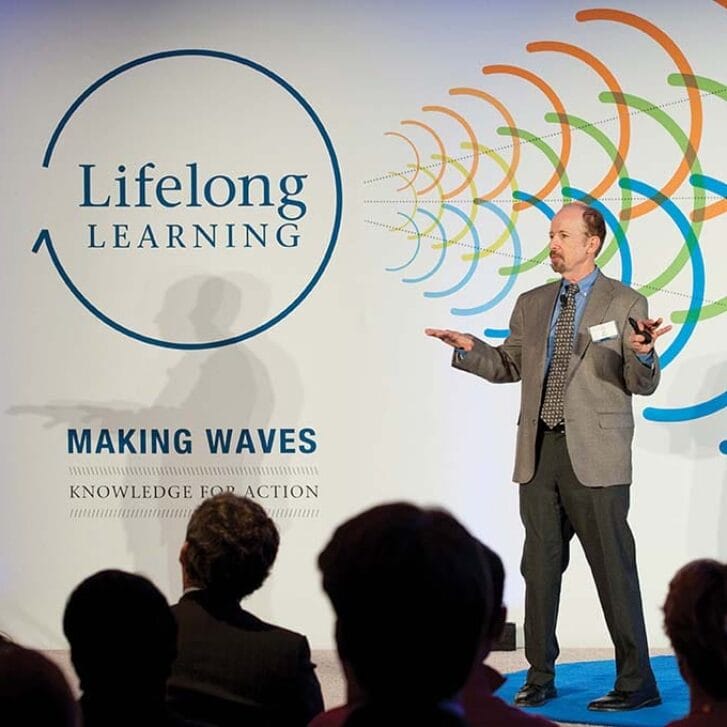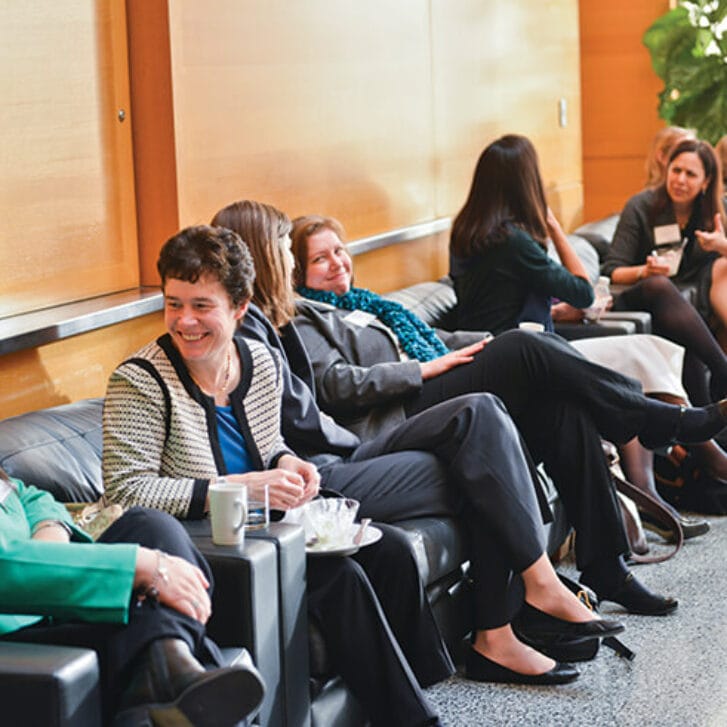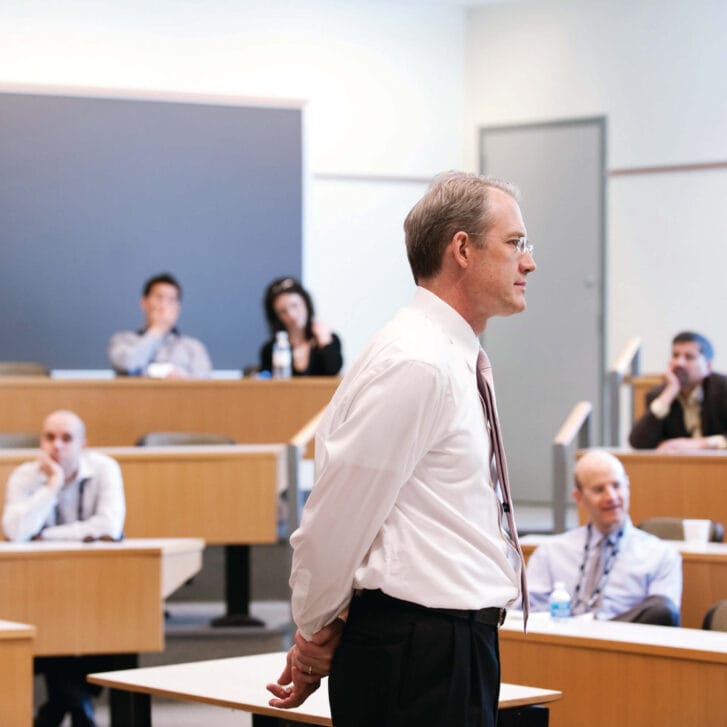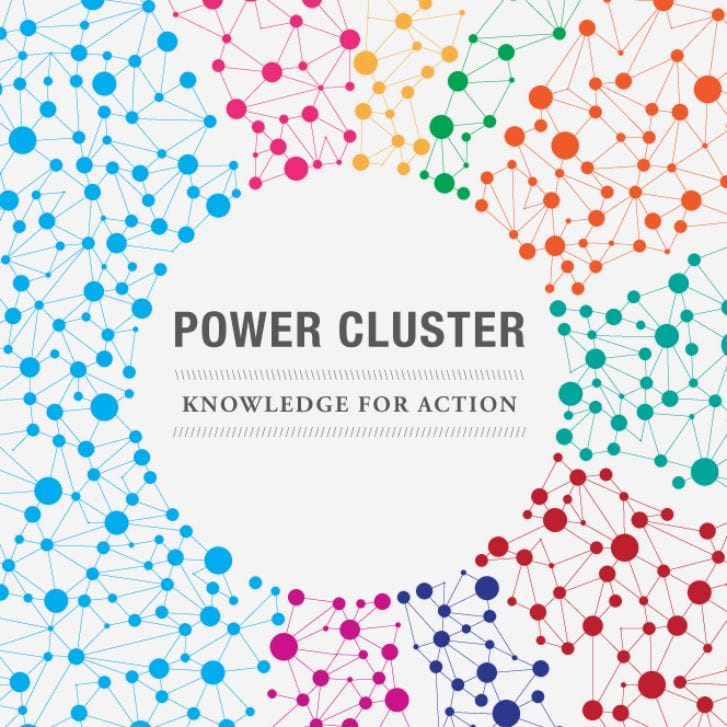Wharton’s MBA alumni now have even more opportunities to leverage the knowledge of faculty—and fellow alumni—as they navigate through each stage of their careers with the Lifelong Learning program. What sets the program apart and increases its value no matter an alumnus’ educational needs, is the give and take among the alumni, administrators and faculty.
Discourse shapes the programming and improves of the educational opportunities through a cycle of feedback from alumni, according to Laura Zarrow, GED’95, senior project director of Wharton’s Innovation Group and chair of the Lifelong Learning Core Team. This feedback loop was launched in the winter with the MBA Reunion Idea Tournament.
“It’s not just to figure out how to run reunion programming, but it’s a pilot on how to get alumni input, so we can better implement programming that will serve them well,” Zarrow says. “We desperately need this cyclic process of planning, implementation and assessment. Alumni input drives planning, and their feedback on the experience is assessment, which then shapes the next round of planning in concert with new input regarding needs and preferences.”
The Lifelong Learning team is thus engaged in an ongoing process of working with alumni to deliver what they need.
Sizeable for All
The cycle of feedback endows the program with flexibility and adaptability. And as Cara Costello, senior associate director, alumni services, at Wharton MBA Career Management, says, perhaps the real value of the Lifelong Learning program is that it is not one-size-fits all.
“Alumni have needs for different learning models at different times in their life,” she says. “It can add tremendous value doing their day-to-day work activities,which can add both short-term and long-term value to their firms.”
Maryellen Lamb, director of MBA Career Management, says the key to all of the various components of the Lifelong Learning program is their collaborative nature.
Currently, the Lifelong Learning team is planning opportunities for alumni to meet and engage with Wharton faculty at the global Knowledge for Action: Lifelong Learning Event series, scheduled for later this year. Moreover, the Wharton Alumni Coaching Exchange (ACE)—the peer-to-peer coaching network—and crowd-sourced learning component of the MBA 2012 Reunion are also in development. Customized content is already being developed in response to alumni input.
The Innovation Group, in conjunction with other departments, was charged by Dean Thomas S. Robertson to develop the Lifelong Learning program as an extension of the MBA curriculum revision, which is being implemented in fall 2012. To determine how alumni could benefit from an expanded learning program, the Innovation Group conducted a needs analysis and interviewed alumni at various stages of their careers, according to Zarrow. (For the full details of this needs assessment, see “Lifelong Learning is …,” Winter 2012, P. 30-31.)
Suited for Transitions
One crucial takeaway from the needs assessment process is that Wharton must tailor learning opportunities to serve alumni at each career stage, Zarrow says. These stages are accompanied by distinct needs and opportunities for growth.
The first career stage is “post-undergraduate,” made up of highly motivated professionals in entry-level positions eager to partner with each other via “crowd-sourced learning” opportunities. They are “digital natives” who can create a “global community” through technology, she says. Alumni at this career stage express the need for just-in-time learning and shared information.
“Usually two to five years after students have received their MBA, they are making their next move,” Lamb says. “They come for advice on how to do that, so it’s still very tactical.”
Another important transition, according to Lamb, occurs when MBA graduates make their move to their first real management role. Early- to mid-career MBA graduates have highly sought-after technical skills, but little, if any actual managerial experience, Zarrow says. As such, they need to develop their “soft skills” in negotiation and leadership management. They are also positioned around the globe and in a stage of their personal and professional lives that leaves very little free time, making crowd-sourced online learning or regional events ideal delivery methods.
People re-entering the workforce at any stage or age would also benefit from lifelong learning programming, says Costello.
“We also often find this need in people who are in a career transition—women or men re-entering the job market after taking care of children or an elderly parent, or retirees going back to work due to financial reasons or just that they want to find productive work, picking up a skills set in addition to managing people,” Costello says.
For those in their mid- to late-career stage, they tend to be at the helm of their organizations, seizing opportunities and building partnerships “They are also past the point of needing an executive education class. They are making change happen,” Zarrow says. “As such, they look for pointed information that facilitates their work. They also want to talk to their peers about the issues that are unique to leaders at that level.”
No matter what stage alumni are moving through, the feedback, exchange and adaptation to alumni input inherent in the design of the Lifelong Learning initiative give alumni a way to tell the School what they need. The feedback loop helps Wharton help alumni to be successful professionally through meaningful educational opportunities.
“Because it’s coming out of the Innovation Group, it means we can approach this as an ongoing process that will continue to evolve from input. It’s not a project that gets finished; it’s a process of continual innovation and adaptation,” Zarrow says.




















